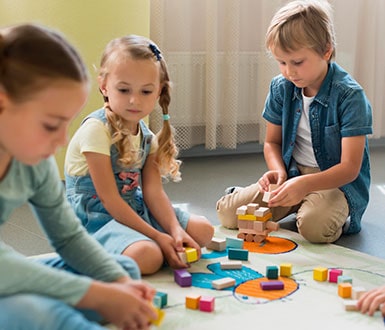As an expert in child psychology, I can affirm that connecting children with nature and the earth is not merely a leisure activity, but a crucial aspect of their holistic development. The natural world offers an unparalleled environment for growth, learning, and mental well-being. In this article, I will delve into the many reasons why it is vital for children to establish a connection with nature and how it benefits their physical, cognitive, emotional, and social development.
1. Physical Health Benefits
a. Encourages Physical Activity:** Outdoor play naturally promotes physical activity. Running, climbing, jumping, and exploring are inherent parts of outdoor play, helping children develop their gross motor skills, coordination, and overall physical fitness.
b. Reduces Risk of Obesity:** Regular outdoor activity can help combat childhood obesity by providing a fun and engaging way to stay active. Studies have shown that children who spend more time outdoors tend to have lower body mass indices (BMIs).
**c. Enhances Immune System:** Exposure to natural environments can boost the immune system. Playing in the dirt and being exposed to different natural elements can help build stronger immune defenses against common illnesses.


2. Cognitive Development
a. Stimulates Curiosity and Learning:
Nature is a vast, ever-changing classroom. It stimulates children’s curiosity and encourages them to learn about the world around them. Observing plants, animals, and natural phenomena fosters a sense of wonder and a desire to understand how things work.
b. Improves Concentration and Academic Performance:** Time spent in nature has been linked to improved concentration and better performance in school. Natural settings can reduce symptoms of attention deficit hyperactivity disorder (ADHD) and help children focus better on tasks.
c. Enhances Problem-Solving Skills:** Nature provides countless opportunities for unstructured play, which is essential for developing problem-solving skills. Children learn to navigate new environments, overcome obstacles, and think creatively to achieve their goals.
3. Emotional and Mental Well-Being
a. Reduces Stress and Anxiety:
Spending time in natural settings has been shown to reduce stress and anxiety in children. The calming effect of nature helps lower cortisol levels, leading to improved mood and emotional stability.
b. Boosts Self-Esteem and Confidence:
Engaging with nature can enhance children’s self-esteem and confidence. Accomplishing challenges like climbing a tree or hiking a trail can provide a sense of achievement and self-worth.
c. Promotes Emotional Regulation:
Nature can teach children to manage their emotions better. The tranquility of natural environments provides a soothing backdrop for children to reflect and process their feelings, leading to better emotional regulation.
4. Social Development
a. Fosters Social Interaction:
Outdoor play often involves group activities that require cooperation, negotiation, and teamwork. These interactions are crucial for developing social skills and building friendships.
b. Encourages Empathy and Compassion:
Connecting with nature can foster a sense of empathy and compassion. Children who spend time caring for plants or animals are more likely to develop a caring attitude toward other living beings and the environment.
c. Enhances Communication Skills:
Nature-based activities often involve discussions and collaborative problem-solving, which can enhance children’s communication skills. They learn to express their thoughts, listen to others, and work together to achieve common goals.
5. Environmental Stewardship
a. Instills a Love for the Environment:
Early experiences in nature can instill a lifelong love and respect for the environment. Children who connect with nature are more likely to become environmentally conscious adults who advocate for the protection of natural resources.
b. Teaches Responsibility:** Caring for a garden, looking after a pet, or participating in environmental conservation projects teaches children responsibility. They learn the importance of taking care of the world around them and the impact of their actions on the environment.
c. Promotes Sustainable Practices:** Children who are educated about nature and its importance are more likely to adopt sustainable practices in their daily lives. They understand the significance of reducing waste, conserving water, and protecting wildlife.
How to Encourage Nature Connection
1. Provide Regular Opportunities for Outdoor Play:
Make nature a regular part of your child’s routine. Encourage daily outdoor play in parks, gardens, or even your backyard.
2. Plan Nature-Based Activities:
Organize family outings to nature reserves, hiking trails, or beaches. Activities like camping, fishing, or bird watching can be both educational and fun.
3. Create a Nature-Friendly Environment at Home:
Incorporate elements of nature into your home environment. Have indoor plants, create a small garden, or set up a bird feeder to bring nature closer to your child.
4. Educate About the Environment:
Teach your child about the environment and the importance of conservation. Use books, documentaries, and interactive activities to make learning about nature engaging and informative.
5. Lead by Example:
Show your child that you value nature by spending time outdoors yourself. Your enthusiasm for the natural world will inspire them to explore and appreciate it too.
Connecting children with nature and the earth is essential for their overall development. The physical, cognitive, emotional, and social benefits are immense, and the lessons they learn from nature are invaluable. By fostering a deep connection with the natural world, we not only support their growth and well-being but also nurture a generation of environmentally conscious individuals who will cherish and protect our planet for years to come. So, let’s encourage our children to step outside, explore, and discover the wonders of nature. The earth is their playground, and it has so much to offer.

